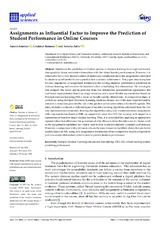Mostrar el registro sencillo del ítem
Assignments as Influential Factor to Improve the Prediction of Student Performance in Online Courses
| dc.contributor.author | Esteban, Aurora | |
| dc.contributor.author | Romero Morales, C. | |
| dc.contributor.author | Zafra Gómez, Amelia | |
| dc.date.accessioned | 2021-10-29T10:35:04Z | |
| dc.date.available | 2021-10-29T10:35:04Z | |
| dc.date.issued | 2021 | |
| dc.identifier.uri | http://hdl.handle.net/10396/22002 | |
| dc.description.abstract | Studies on the prediction of student success in distance learning have explored mainly demographics factors and student interactions with the virtual learning environments. However, it is remarkable that a very limited number of studies use information about the assignments submitted by students as influential factor to predict their academic achievement. This paper aims to explore the real importance of assignment information for solving students’ performance prediction in distance learning and evaluate the beneficial effect of including this information. We investigate and compare this factor and its potential from two information representation approaches: the traditional representation based on single instances and a more flexible representation based on Multiple Instance Learning (MIL), focus on handle weakly labeled data. A comparative study is carried out using the Open University Learning Analytics dataset, one of the most important public datasets in education provided by one of the greatest online universities of United Kingdom. The study includes a wide set of different types of machine learning algorithms addressed from the two data representation commented, showing that algorithms using only information about assignments with a representation based on MIL can outperform more than 20% the accuracy with respect to a representation based on single instance learning. Thus, it is concluded that applying an appropriate representation that eliminates the sparseness of data allows to show the relevance of a factor, such as the assignments submitted, not widely used to date to predict students’ academic performance. Moreover, a comparison with previous works on the same dataset and problem shows that predictive models based on MIL using only assignments information obtain competitive results compared to previous studies that include other factors to predict students performance. | es_ES |
| dc.format.mimetype | application/pdf | es_ES |
| dc.language.iso | eng | es_ES |
| dc.publisher | MDPI | es_ES |
| dc.rights | https://creativecommons.org/licenses/by/4.0/ | es_ES |
| dc.source | Applied Sciences 11(21), 10145 (2021) | es_ES |
| dc.subject | Multiple Instance Learning | es_ES |
| dc.subject | Educational data mining | es_ES |
| dc.subject | OULAD | es_ES |
| dc.subject | Virtual learning system | es_ES |
| dc.subject | Predicting performance | es_ES |
| dc.title | Assignments as Influential Factor to Improve the Prediction of Student Performance in Online Courses | es_ES |
| dc.type | info:eu-repo/semantics/article | es_ES |
| dc.relation.publisherversion | https://doi.org/10.3390/app112110145 | es_ES |
| dc.relation.projectID | Gobierno de España. PID2020-115832GB-100 | es_ES |
| dc.rights.accessRights | info:eu-repo/semantics/openAccess | es_ES |

